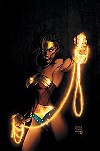
Absolutely Ellis, Ennis, Morrison & Millar are forward-looking; re-inventing and interpreting, and most definitely not re-hashing old stories. But their superhero work is clearly about what superheroes are about.
The dispute I have with this book (which I enjoyed greatly in execution, which I bought and read and do not wish to sell off at the earliest opportunity) is that the superheroics stuff, however well-written, is almost completely incidental to what happens in the book. Of course it's great that it sells well, of course it's great that it gets press and so on, but the core of the story is destructive, it's short-sighted and it's not sustainable.
Sure, the Deathstroke scene is fantastic - what a rockin' way to kick off a second issue. The art's exemplary - I know exactly what's going on throughout that scene, there's no confusion despite the presence of 8 or 9 people, all seriously involved in the fight. I Love it! A serious draftsman with a solid comprehension of anatomy and composition is drawing a top-selling book. FANTASTIC.
But it's destructive. It tells us, essentially, that Superheroes Don't Work.
The JLA can't deal with the real world. Sure, they can stop Darkseid from bonding with the source, they can stop the Queen Bee from taking over the planet, they can even travel to the 853rd Century and stop an evil Sun from destroying Superman as he emerges from his Solar Fortress... but a bad man fucks a nice lady, and they have to attack each other.
I love comics as a medium - I think it's an exciting way to tell stories. And I like non-superhero books a lot, I think that, to survive, there needs to be a better balance between men in tights and everything else in this industry.
But I also love superheroes - you know this as well as anyone else.
When Batman is, essentially, TOO MORAL; when Superman has to walk away from problems because he doesn't want to hear about them; when Dr Light is terrifying to the JLA because he has a dick and Jean Loring can go around destroying lives because she's not getting any...
... then superheroes don't work.
And if that's the core of the story that's gotten all this press attention, that people are buying in their droves (and I know that that's a simplistic interpretation of the book, but that's what I see when I strip away to the core ideas), then that's just a self-inflicted wound by an already shakey medium.
Again: It's well-written. It's got great art. It has some kick-ass character-driven super-hero stuff, and nothing happens in the story that isn't consistent.
But I think it's too easy to break superhero comics.
"Superman hasn't stopped world hunger - he's pointless."
"One lucky shot, and Batman dies."
"How old is Spider-Man again? Coz he's gotta be in his 50s at least, all the stuff he's done. And BTW, radioactive spider bite - that'd kill you. Just FYI."
The book is about what doesn't work in the genre. Watchmen did this, did practically this exact story, 20 years ago. And did it in such a way to provide an answer to the question as well.
(ID Crisis is in my "To Re-Read" pile at the moment. Countdown is on order.)
1 comment:
[sam]
Yeah, that's a fair comment; you're right, the 7 issues is, potentially, not the end of that story. Just as all the major characters of the DCU have evolved in various ways, so too will this make them move in a different direction.
Post a Comment